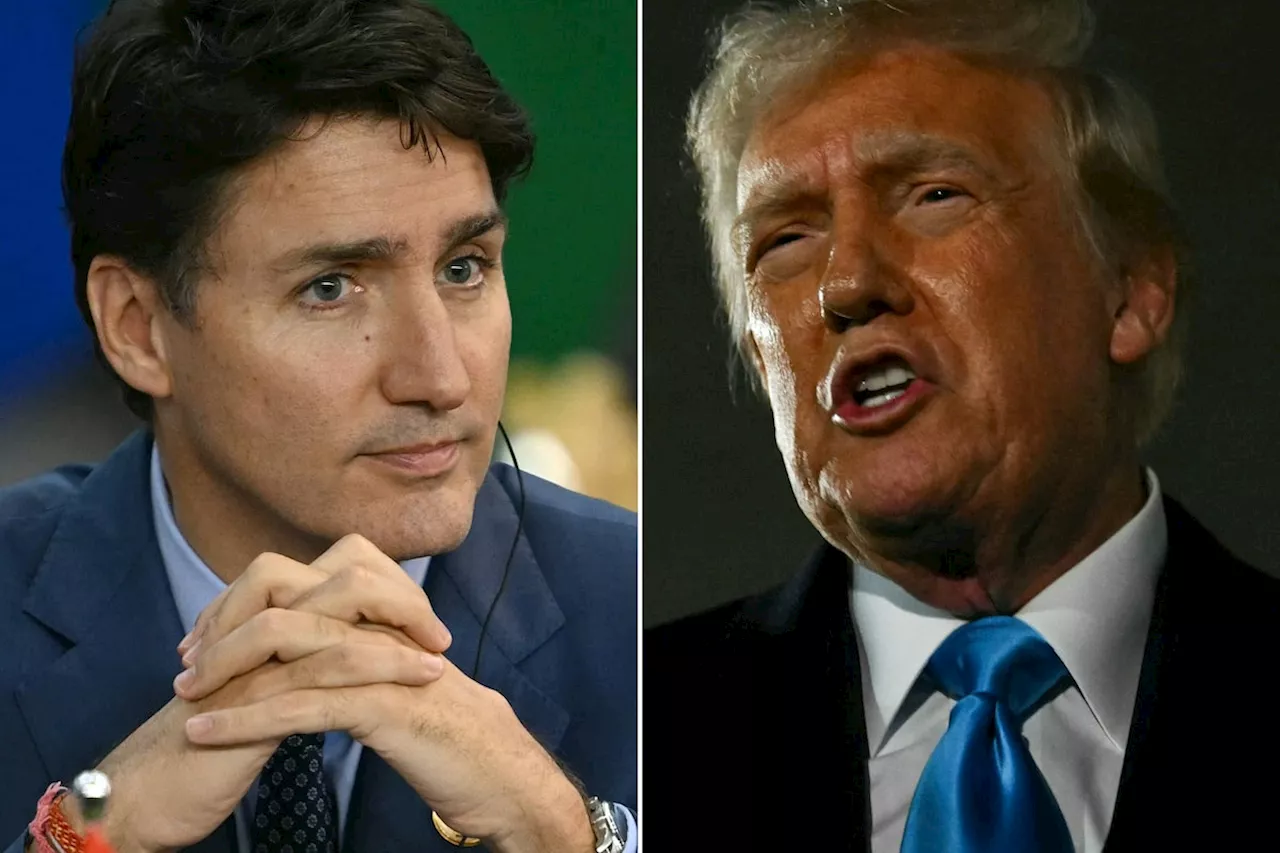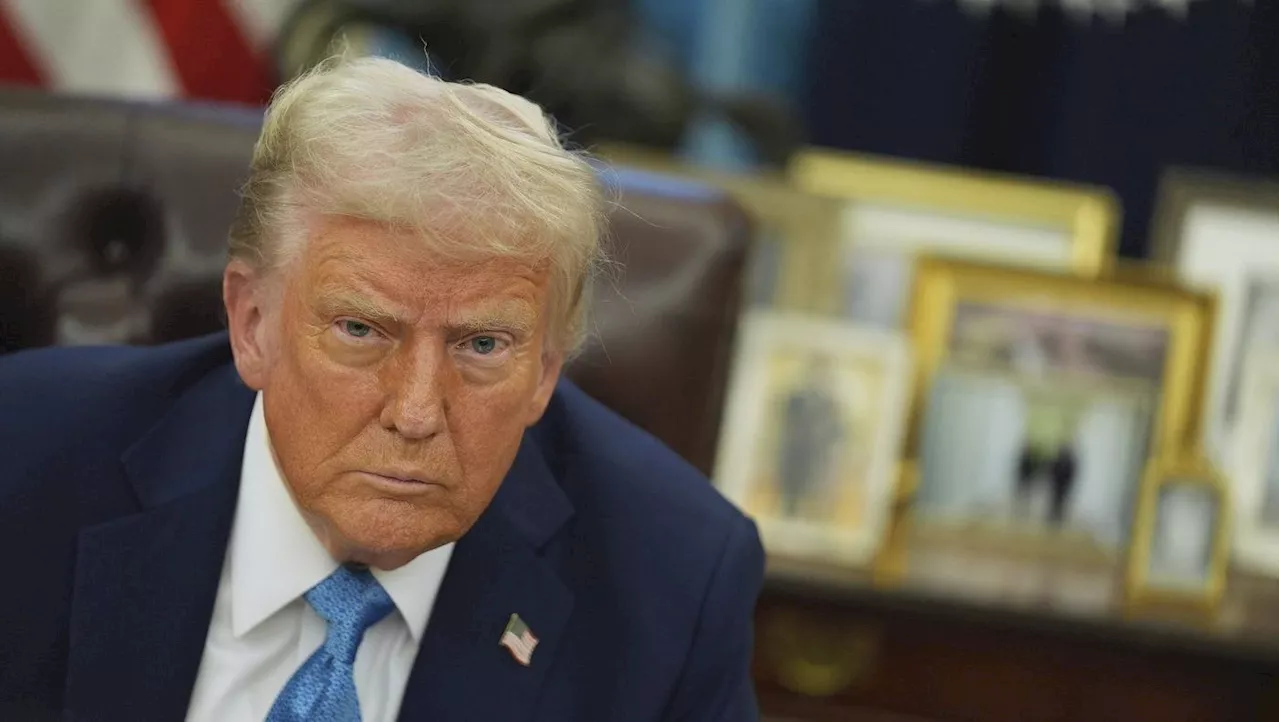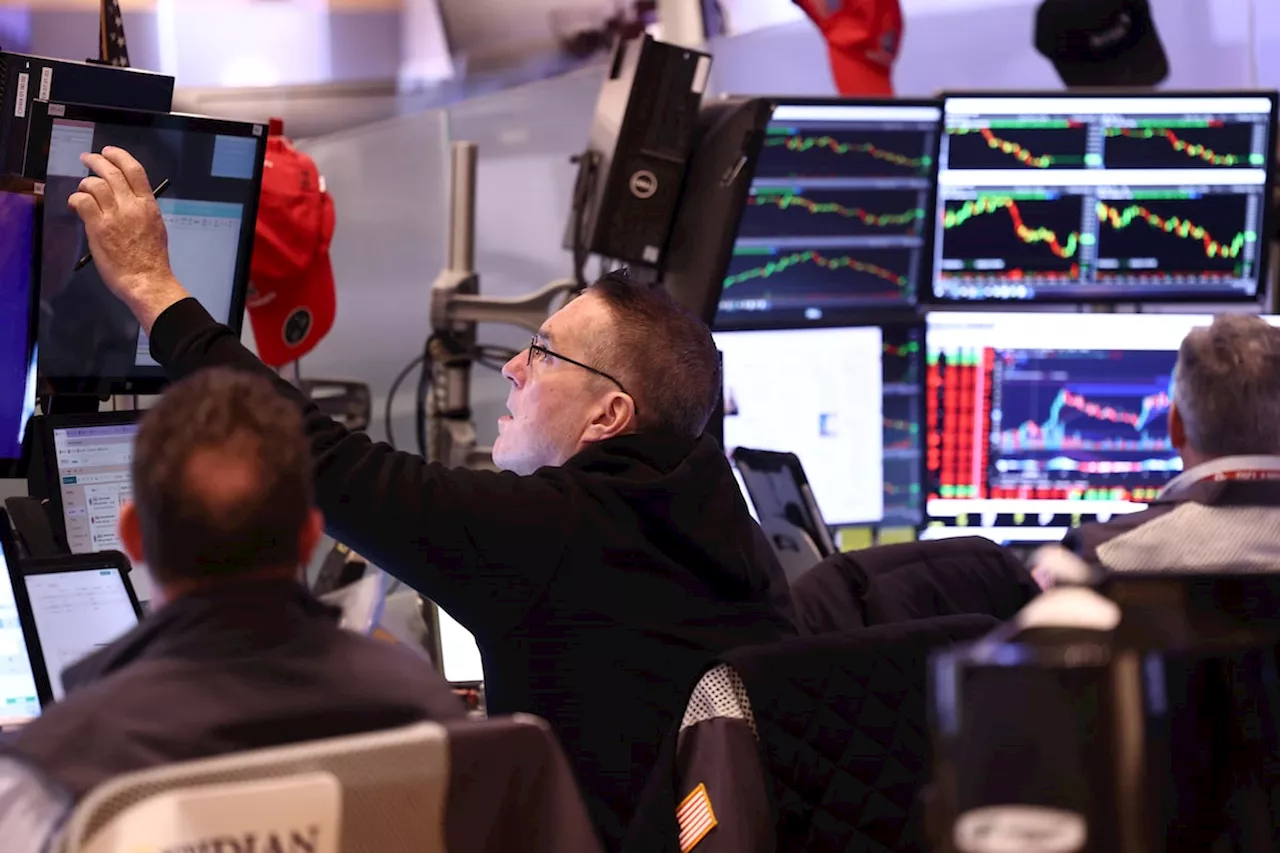The Canadian stock market experienced a significant slump on Monday, driven by concerns over U.S. President Donald Trump's newly imposed tariffs on imports from Canada and Mexico. The tariffs have ignited a trade war, raising fears of economic instability and recession. While the U.S. agreed to delay tariffs against Mexico for a month, Canadian businesses, particularly those involved in exports and financial services, are bracing for impact.
Traders work on the floor of the New York Stock Exchange during morning trading on Feb. 3, in New York City. All three major indexes opened on a downward trajectory to start the month of February after U.S. President Donald Trump signed an executive order enacting 25% tariffs on imports from Canada and Mexico.The stock market ignored U.S. President Donald Trump’s months-long threat to impose stiff tariffs on key U.S. trading partners.
Was the market’s initial reaction to tariffs any better? On Friday, Mr. Trump announced 25-per-cent tariffs on Canadian and Mexican imports. Canada and Mexico retaliated with tariffs against U.S. imports, setting off a trade war that many observers believe will destabilize trade, raise U.S. inflation and cause a recession in Canada. “We were confident that tariffs were coming, but this was much worse than expected,” Ian de Verteuil, a strategist at CIBC Capital Markets, said in a note Sunday. The U.S. announced Monday it has agreed to delay tariffs against Mexico for a month, suggesting that negotiations are back on. After markets closed, Prime Minister Justin Trudeau similarly announced that Mr. Trump agreed to pause tariffs on Canada for 30 days.Darko Mihelic, an analyst who covers the Canadian financial sector for RBC Dominion Securities, warned of downside risk to bank stocks and life-insurance companies as the sector adjusts to weaker credit health, slower loan growth and an economic downturn. “Canadian bank stocks will not perform well, as suggested by past performance entering a recession,” Mr. Mihelic said in a note. In early trading on Monday, stocks acknowledged this gloomy outlook, marking a fundamental shift in sentiment from just days before. The S&P/TSX Composite Index, which closed at a record high on Thursday, fell as much as 3.1 per cent soon after trading began. The benchmark retraced some of those losses, ending down 291.34 points or 1.1 per cent. The steep selloff hit industrial exporters, diversified financial services and trade-oriented stocks particularly hard. Auto parts giant Magna International Inc., rail operator Canadian Pacific Kansas City Ltd. and Canadian Imperial Bank of Commerce were among the biggest casualties among blue-chip stocks. Their misfortunes suggested that Canada – and Canadian-focused investors – were in a bad place right now. The big fear is that this first setback offers a taste of the misery to come, especially if the threat of an economic downturn becomes real. The good news: Far from being a fully demoralizing rout, there were pockets of encouraging market responses on Monday that hint at better days ahead. A big one was that Canada wasn’t alone nursing losses. Japan’s Nikkei 225 fell 2.7 per cent and Britain’s FTSE 100 fell more than 1 per cent. Most importantly, the S&P 500 fell as much as 1.8 per cent soon after trading began, before recovering some lost ground. General Motors Co. initially slid as much as 6.2 per cent, while Telsa Inc. fell even more, supporting the idea that Mr. Trump’s tariff policy will inflict pain at home, too. Widespread pain is nothing to celebrate, but it could encourage Mr. Trump’s administration to soften its stance on tariffs. Already, the U.S. has agreed to delay tariffs against Mexico for a month, according to reports on Monday, suggesting that negotiations are back on. Another source of encouragement in Monday’s market action: Some financial assets provided a valuable cushion. The shares of Canadian gold producers gained as gold – which is often held as a hedge against financial shocks – pushed toward a new record-high price. Kinross Gold Corp. ended the day up 1.8 per cent and Agnico Eagle Mines Ltd. closed 2.3 per cent higher, offsetting losses elsewhere. As well, Canadian bond prices rallied, sending yields lower. As a result, diversified portfolios that use bonds as a stabilizer were left relatively unscathed. The Vanguard Balanced ETF Portfolio, an exchange-traded fund that maintains 40-per-cent exposure to bonds, fell 0.35 per cent in afternoon trading on Monday.Beaten-up Canadian telecom stocks, which operate in domestic markets and so have little or no exposure to tariffs, generally ignored the market mayhem elsewhere. Similarly, some utilities – including Emera Inc. and Fortis Inc. – gained ground. One day of trading might be meaningless as financial markets respond to what could be years of bluster, threats and mercurial policy shifts from the White House. But the initial take suggests that staying put, recognizing the value of asset diversification and celebrating those sectors that are impervious to tariffs might help investors ride out the next four years
TARIFFS TRADE WAR CANADA MEXICO INVESTMENTS STOCK MARKET ECONOMY FINANCIAL MARKETS
Canada Latest News, Canada Headlines
Similar News:You can also read news stories similar to this one that we have collected from other news sources.
 Trump Hints at February Tariffs on Canadian Goods, While Canadian Politicians Back Away from Carbon PricingThis article covers several news stories from The Canadian Press. It starts with US President Donald Trump's suggestion of 25% tariffs on Canadian imports by February 1st, despite earlier indications of a study on trade practices. The article also discusses the three frontrunners in the Liberal leadership race shifting away from the Liberal government's carbon pricing policy. Other news covered includes Statistics Canada's upcoming release of December's inflation figures, thawing permafrost in the Arctic tundra, and a focus on the benefits of small care homes for long-term residents.
Trump Hints at February Tariffs on Canadian Goods, While Canadian Politicians Back Away from Carbon PricingThis article covers several news stories from The Canadian Press. It starts with US President Donald Trump's suggestion of 25% tariffs on Canadian imports by February 1st, despite earlier indications of a study on trade practices. The article also discusses the three frontrunners in the Liberal leadership race shifting away from the Liberal government's carbon pricing policy. Other news covered includes Statistics Canada's upcoming release of December's inflation figures, thawing permafrost in the Arctic tundra, and a focus on the benefits of small care homes for long-term residents.
Read more »
 Trump to Implement Tariffs on Canadian Goods, Prompting Canadian ResponseU.S. President Donald Trump's inauguration speech signaled his intention to impose tariffs on Canadian goods, reversing earlier reports that suggested a delay. Canadian officials have expressed preparedness for this move, outlining plans to defend Canadian interests and jobs.
Trump to Implement Tariffs on Canadian Goods, Prompting Canadian ResponseU.S. President Donald Trump's inauguration speech signaled his intention to impose tariffs on Canadian goods, reversing earlier reports that suggested a delay. Canadian officials have expressed preparedness for this move, outlining plans to defend Canadian interests and jobs.
Read more »
 Canadian Ministers Race to Washington to Avert Trump Tariffs on Canadian GoodsThree Canadian cabinet ministers are in Washington, D.C., making a final plea to U.S. President Donald Trump to avoid imposing harmful tariffs on Canadian imports.
Canadian Ministers Race to Washington to Avert Trump Tariffs on Canadian GoodsThree Canadian cabinet ministers are in Washington, D.C., making a final plea to U.S. President Donald Trump to avoid imposing harmful tariffs on Canadian imports.
Read more »
 Trump Delays Mexico Tariffs, Demands Canadian Bank AccessU.S. President Trump delayed imposed tariffs on Mexico for one month after a conversation with Mexican President Sheinbaum. Sheinbaum agreed to increase border security to combat drug trafficking. Meanwhile, Trump is demanding greater access for American banks in Canada, escalating tensions with its northern neighbor. Despite stating the tariffs are intended to combat drug trafficking, the move ignited anxieties among business groups and some Republicans.
Trump Delays Mexico Tariffs, Demands Canadian Bank AccessU.S. President Trump delayed imposed tariffs on Mexico for one month after a conversation with Mexican President Sheinbaum. Sheinbaum agreed to increase border security to combat drug trafficking. Meanwhile, Trump is demanding greater access for American banks in Canada, escalating tensions with its northern neighbor. Despite stating the tariffs are intended to combat drug trafficking, the move ignited anxieties among business groups and some Republicans.
Read more »
 Trump Threatens Tariffs on Canada, Amidst Awaiting Decision on Oil LeviesCanadian officials are anxiously awaiting U.S. President Donald Trump's decision on tariffs against Canadian imports. Trump hinted at imposing 25% tariffs on goods from Canada and Mexico, but also suggested a potential 10% tariff on Canadian oil. While Trump's initial deadline of February 1st has passed without action, he remains adamant about imposing tariffs. Canadian officials have prepared retaliatory measures and engaged in diplomatic efforts to avert the tariffs.
Trump Threatens Tariffs on Canada, Amidst Awaiting Decision on Oil LeviesCanadian officials are anxiously awaiting U.S. President Donald Trump's decision on tariffs against Canadian imports. Trump hinted at imposing 25% tariffs on goods from Canada and Mexico, but also suggested a potential 10% tariff on Canadian oil. While Trump's initial deadline of February 1st has passed without action, he remains adamant about imposing tariffs. Canadian officials have prepared retaliatory measures and engaged in diplomatic efforts to avert the tariffs.
Read more »
 Trump Threatens Canadian Tariffs, Uncertainty RemainsU.S. President Donald Trump's threat to impose tariffs on Canadian goods hangs over Ottawa, with Canadian officials awaiting clarity on the president's next move. While Trump flagged plans for 25% tariffs on imports from Canada and Mexico, he hinted at a possible 10% levy on Canadian oil and suggested implementation could be delayed until February 18th. Canadian ministers engaged in talks with U.S. officials in a bid to avert the tariffs but Trump remained firm, stating that no concessions would prevent the levies.
Trump Threatens Canadian Tariffs, Uncertainty RemainsU.S. President Donald Trump's threat to impose tariffs on Canadian goods hangs over Ottawa, with Canadian officials awaiting clarity on the president's next move. While Trump flagged plans for 25% tariffs on imports from Canada and Mexico, he hinted at a possible 10% levy on Canadian oil and suggested implementation could be delayed until February 18th. Canadian ministers engaged in talks with U.S. officials in a bid to avert the tariffs but Trump remained firm, stating that no concessions would prevent the levies.
Read more »
